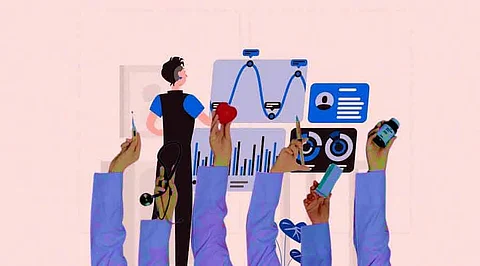

Within the field of data analytics, predictive analytics is a discipline that primarily uses modeling, data mining, artificial intelligence, and machine learning approaches. It is employed to assess current and past data in order to forecast future events.
Healthcare practitioners may use predictive analytics to identify possibilities to make more effective and efficient clinical and operational choices, forecast trends, and even control the spread of illnesses by analyzing historical and current healthcare data.
Any information pertaining to an individual's or a population's health is considered healthcare data, and it can be gathered via administrative and medical records, health surveys, disease and patient registries, claims-based datasets, and electronic health records (EHRs). Healthcare organizations, hospitals, physicians, psychologists, pharmacists, pharmaceutical firms, and even healthcare stakeholders may all utilize and profit from healthcare analytics as a tool to deliver higher-quality treatment.
These healthcare domains are greatly impacted by data analytics' capacity to convert unprocessed medical data into meaningful insights:
1. clinical investigation
2. creation of novel therapies
3. creation of novel medications
4. Disease prognosis and prevention
5. clinical judgment assistance
6. faster and more precise medical problem diagnosis
7. high surgical and pharmaceutical success rates
8. Automating administrative procedures in hospitals
9. More precise estimation of health insurance premiums
Predictive analytics' ability to access a wide range of data, including comorbidities, demographic, and medical history, is its most significant contribution to the healthcare sector. Physicians and other healthcare professionals can make informed judgments because to the wealth of data available to them. Making data-driven, intelligent, and better judgments results in overall better patient care.
Medicine has always operated on a one-size-fits-all basis. Instead than focusing on individual patients, data from a large population have been used to suggest treatments and medications based on scant information. However, as medical practitioners become more adept at diagnosing patients, they will also be able to choose the best course of action based on each patient's particular set of circumstances.
There are applications for predictive analytics beyond the individual level. It may also be used by healthcare organizations to control population health. Analytics may be used to identify comparable patients within a population cohort when they have information on the illnesses, treatments, and personal histories of the patients. Identifying cohorts exposed to a potential disease epidemic can also be aided by it. Healthcare providers can begin considering therapies right once in such a situation, increasing the likelihood that patients will survive.
In order to prevent deeper issues, predictive analytics in healthcare can identify patients who are more likely to experience problems and initiate early innervations. Rather than waiting for at-risk patients to schedule routine visits, physicians and healthcare institutions can proactively deliver care by using predictions about the incidence of disease and chronic illness.
Predictive analytics has long been utilized in other industries, such manufacturing and telecoms, to anticipate maintenance needs. The same type of prognostics might be advantageous to the healthcare sector. Machine parts are subject to wear and tear or degradation. Predictive analytics, for instance, may forecast malfunctions and the need to replace a component by examining the data from sensors in an MRI machine. Knowing this allows hospitals to plan maintenance for when the equipment is not in use, reducing disruptions to workflow that are detrimental to patients and care teams alike.
Human mistake has the potential to be lethal in the healthcare system. Thankfully, data may help identify possible errors and save deadly blunders by giving medical practitioners precise, real-time information to guide their actions.
Costs associated with healthcare can also be decreased with predictive analytics. By lowering needless treatment and hospital stays when they are not essential, managing hospital expenses for medications and supplies, and anticipating staffing demands, it may be utilized to save patient expenditures.
Join our WhatsApp Channel to get the latest news, exclusives and videos on WhatsApp
_____________
Disclaimer: Analytics Insight does not provide financial advice or guidance on cryptocurrencies and stocks. Also note that the cryptocurrencies mentioned/listed on the website could potentially be scams, i.e. designed to induce you to invest financial resources that may be lost forever and not be recoverable once investments are made. This article is provided for informational purposes and does not constitute investment advice. You are responsible for conducting your own research (DYOR) before making any investments. Read more about the financial risks involved here.
